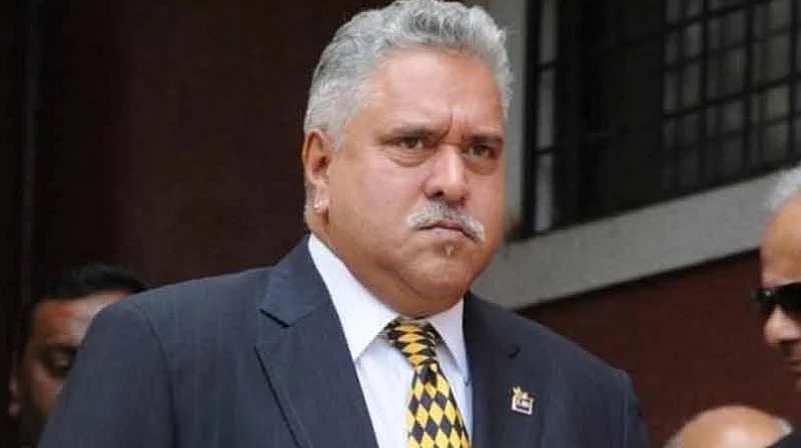Vijay Mallya's defence during his extradition trial on Thursday claimed that a consortium of Indian banks led by State Bank of India (SBI) rejected an offer by the liquor baron in early 2016 to pay back nearly 80 per cent of the principal loan amount owed to them.
The Crown Prosecution Service (CPS) – arguing on behalf of the Indian government – countered that assertion, indicating that the reason such a repayment offer would have been rejected was that the banks knew Mallya had the means to pay back the entire amount due.
The 61-year-old businessman returned to the dock for day three of his extradition trial at Westminster Magistrates' Court in London to determine whether he can be forced to return to India to face charges of fraud and money laundering allegedly amounting to around Rs 9,000 crores.
While deposing a banking expert on Thursday, his counsel Clare Montgomery questioned whether her client's offer to pay back around Rs 4,400 crores of the principal debt amount on April 6, 2017 should have been "dismissed out of hand" just a day later by the banks.
Paul Rex, who was described as a banker by profession who has served as an independent expert in the field for over 20 years, said that banks tend to partially provision for loans unpaid over a long period and such an offer would have helped avoid "further loss".
"A commercial bank would assess such an offer against other routes of repayment. If that offer is higher than could be expected from other sources, it would be an attractive option for banks to consider," he said, adding that state-owned banks, in particular, tend to be more susceptible to "political pressure".
CPS barrister Mark Summers during his cross-examination stated that there were plenty of reasons why even a state bank may take a view to reject such an offer, like if it comes from a "dishonest" person who is known to have "plenty of money to repay" the entire amount if he wants to.
He also made a reference to the "debtor" [Mallya] throwing a birthday party costing around 2 million pounds as a factor which could have influenced the banks' decision to reject the offer.
The cross-examination of Rex was left incomplete at the end of the third day of the trial, to be taken up again on Tuesday afternoon.
The hearing itself will resume on Monday morning but is likely to have "interruptions" as the appeal of taxi hailing company Uber over the cancellation of its London license is also scheduled to open in the same court.
Thursday's hearing revolved around Rex’s testimony to analyse the credibility of the documents used by Mallya to seek loans from Indian banks for his then struggling Kingfisher Airlines.
Montgomery sought to back up her opening arguments that the CPS had failed to establish a prima facie case of fraud against her client.
The testimony by Rex was used to highlight that Mallya had no intention to act "fraudulently".
While the CPS stand is that Mallya did not intend to repay the loans he sought because his airline’s demise was inevitable, Montgomery is trying to establish that Kingfisher Airlines was suffering from consequences of a wider global financial crisis around 2009-2010 and that its failure was a result of factors beyond the company’s control.
Going over parts of his written witness statements, the banking expert pointed to an appraisal in February 2012 by SBI presented to the Reserve Bank of India (RBI) on the Kingfisher Airlines loan, seeking its recategorisation from "sub- standard" to "standard".
Rex, who highlighted that he has also served as an expert in a previous litigation involving State Bank of India (SBI) and the Board of Control for Cricket in India (BCCI) in the late 1990s, told the court that "banks tend to behave in a herd-like manner" and that banks hold their central banks in a very "high degree of deference".
Their assessment at this time is "quite straightforward", that despite facing severe constraints every effort is being made by the airline including an infusion of substantial funds, he noted.
"SBI is the largest bank in India and one of the most reputable… If I was another bank, I would take note of the fact that SBI had supported a business in a positive way," Rex said.
In his cross-examination, Summers flagged a particular "washing machine activity" picked up by the government of India that involved sums amounting to around 10-15 million pounds being funnelled between UB Group companies to wrongly claim obligations of equity infusions into struggling Kingfisher Airlines were being met.
Indian government sources have described the CPS case as "very strong" and claimed they remain confident that based purely on the "merits of the case" and "documentary evidence", an Indian government victory is assured.V
Laying out her counter-arguments before Judge Emma Arbuthnot, Montgomery had also called into question the "admissibility" of some of the evidence submitted by the CPS.
She claimed that much of the material was questionable and there were at least a dozen documents submitted which read like an identical "template".
The judge has asked both sides to submit a document laying out the factors for and against the admissibility of the evidence submitted by the Indian authorities by the end of this week.
But government sources have asserted that the evidence is based on a set template but the content within the documents cannot be described as a "template".
Mallya, who has been based in the UK since March 2016, was arrested by Scotland Yard on an extradition warrant in April this year and has been out on bail on a bond worth 650,000 pounds.
His extradition trial is scheduled to end on December 14, with Friday marked as non-sitting day.
PTI


























